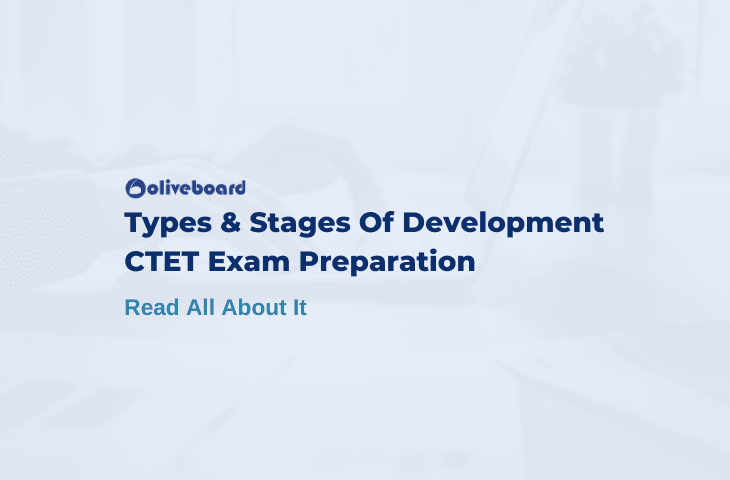Every year, lakhs of candidates aspiring to join the teaching profession sit for the Central Teacher Eligibility Test, conducted by the Central Board of Secondary Education. The entrance exam is conducted across India in July and December. Qualifying candidates are then recruited in Central Government schools in India. In this blog, we will learn about Stages of Development – CTET.
‘Stages and Types of Development’ is an important part of your CTET exam syllabus under Child Development and Pedagogy section. If you are appearing and hoping to crack the upcoming entrance exam, then you must focus on the topic to clear your concept.
Here we are ready to provide you with a summary of the Stages of development – CTET. Read on to know more.
Take up the Free CTET Online Mock Test Now
Stages Of Development – CTET Exam
What are the various stages and types of development?
Many sources have defined the various stages of growth in childhood. Eminent psychologists and theorists, such as Lev Vygotsky, Jean Piaget, Erik Erikson, and Lawrence Kohlberg have proposed various theories to understand the process of development in children. Recent studies have offered vital information regarding the nature of development. Moreover, customs, laws, and social institutions that make up society culturally define the childhood stages. For instance – some professionals and researchers may define early childhood period as birth to age eight, while others may define the same as age five – right about the time when a child starts going to school.
Stages of childhood development can be broadly classified into adolescence, middle childhood, and early childhood.
-
Early Childhood (birth to age 8)
This is the first stage of childhood development. This is the time when tremendous growth is observed across all developmental areas. The dependent infant grows into a young individual who is able to take care of her or his own body and effectively interact with others. Due to this, the main developmental task of early childhood stage is ‘skill development’.
A child of age 3 is able to master certain skills, including walking, sitting, scribbling, holding a spoon, toilet training, and eye-hand coordination to throw and catch a ball. Between ages 3 and 5, the child continues to grow rapidly and starts to develop fine-motor skills. Most children, by the time they turn five, demonstrate good control of crayons, scissors, and pencils. Gross motor accomplishments include the ability to balance or skip on one foot. Between ages 5 and 8, physical growth slows down while motor skills and body proportions become more refined.
These physical changes are accompanied by changes in language development and cognitive development. Over the first three years, the child develops a vocabulary of 300 to 1000 words and is able to learn language. By age 5, his/her vocabulary grows to 1500 words approximately.
Between ages 3 and 5, development in socio-emotional skills includes gender identification, forging peer relationships, and acquiring a sense of wrong and right.
-
Middle Childhood (age 8 to 12)
During the middle childhood stage, children learn about societal values. Recent theorists have identified the importance of this stage for personality development, cognitive skills, interpersonal relationships, and motivation. Thus, the main developmental task in this stage is ‘integration’ in terms of development within the individual and of the individual within the social context.
Cognitive development in this phase is steady and slow. Children are still building upon the skills gained in early childhood and preparing for the next phase of development. They are learning specific skills, like forming a hypothesis and classifying.
This is the time when the child develops competence in social and interpersonal relationships. Although they have a strong peer orientation, they are largely influenced by their families. The social skills they learn through family and peer relationships lay the necessary foundation for the different challenges in adolescence.
-
Adolescence (age 12 to 18)
The final stage of childhood development is adolescence. The chief developmental task of this stage is ‘identity formation’. This is an essential time for cognitive development, as it marks the transition where individuals reason and think about various ideas and problems. In early adolescence, they can order and classify objects, think logically about concrete objects, reverse processes, and consider multiple perspectives at one time.
It is also the stage characterized by conflict between role confusion and one’s own identity. Individuals develop their own concepts within the peer context. In an attempt to become independent, individuals in this stage are often reliant on peer group for advice regarding what is normally accepted. They stop relying on their families as an identity source and are likely to encounter conflicts between family and peer-group affiliation. Stages of Development – CTET is an important topic when it comes to capturing the essence of the development stages.
Elaborated notes and CTET study material on Stages of Development – CTET are available online. Besides textbooks, you can refer to these for better understanding and enhanced knowledge. Once you are confident about your preparations, do not skip the CTET mock tests. That will help you evaluate your performance and allow you to improve on your weak points. Join Oliveboard and take up the Free Mock test for CTET Exam.
Also Check:
- 100+ Free Mock Tests
- Oliveboard Mobile App
- Oliveboard’s discuss forum
- Oliveboard Telegram Group
- Download BOLT – Our Monthly General Awareness free e-book

Hello there! I’m a dedicated Government Job aspirant turned passionate writer & content marketer. My blogs are a one-stop destination for accurate and comprehensive information on exams like Regulatory Bodies, Banking, SSC, State PSCs, and more. I’m on a mission to provide you with all the details you need, conveniently in one place. When I’m not writing and marketing, you’ll find me happily experimenting in the kitchen, cooking up delightful treats. Join me on this journey of knowledge and flavors!
